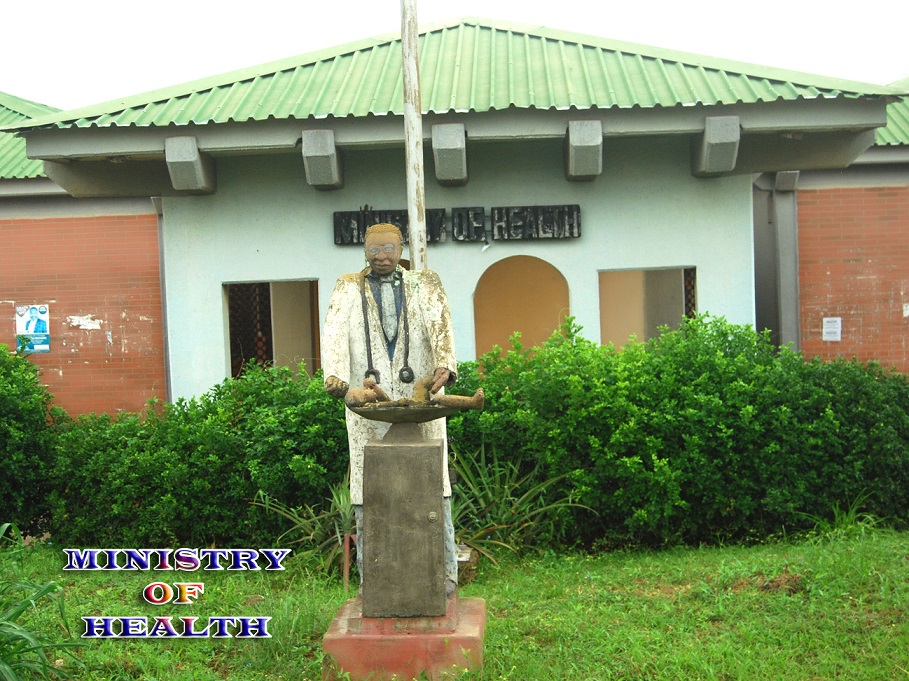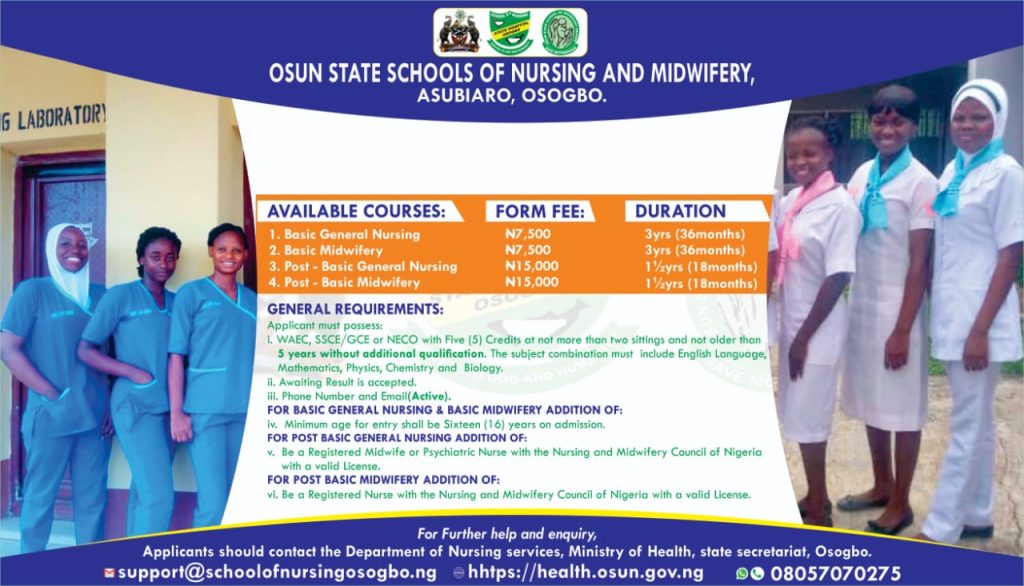
Profile of the ministry
The Ministry of Health has responsibility for the coordination, supervision and regulation of various activities in the health sector of the State towards the delivery of quality healthcare services for the citizens of the State.
The Honorable Commissioner for Health is statutorily the Political Head of the Ministry, while the Special Adviser to the Governor on Public Health (depending on the discretion of the State Governor) is the Chief Adviser on Public Health matters in the State. The Permanent Secretary is the Accounting Officer of the Ministry.
Objectives Of the Ministry
- formulate health care policy for the State;
- promote and co-ordinate health care facilities in the State;
- establish new health care facilities, as well as maintain and expand existing ones in the State;
- promote infrastructural facilities and equipment that will facilitate and the delivery of good healthcare services by Doctors and other healthcare workers in the State;
- maintain existing training Institutions for Doctors, Nurses, Midwives, Community Health Extension Workers and other Paramedical Staff;
- ensure the maintenance of acceptable standard of health care services in both government and private health establishments in the State;
- ensure healthy working environment and reduce occupational hazards in both Public and Private Health Establishments in the State;
- ensure provision of adequate quality drugs for patients in the State;
- carry out disease surveillance and control in the State and;
- carry out advocacy and public enlightenment programmes
Departments in the Ministry of Health
Note: The Ministry of Health exercises supervisory control over two health institutions in the State namely; the School of Nursing, Osogbo as well as the School of Midwifery, Osogbo. Each institution is headed by a principal.
Department of Public Health
The Department of Public Health came into existence following the creation of the State Primary Health Care Development Board in late February, 2017. Before the creation of the Primary Healthcare Development Board, there used to be a Department of Primary Healthcare/Diseases Control in the Ministry of Health.
The Department of Public Health oversees the programme activities in the following areas:
- Malaria
- Epidemiology
- HIV/AIDS
- Tuberculosis/Buruli Ulcer
- Reproductive Health
- Family Planning
- Adolescent Health
- Nutrition
- Non-Communicable Diseases (NCDs) and
- Neglected Tropical Diseases (NTDs)
The Public Health Department focuses on communicable and Non-Communicable diseases and other health issues that are of public health importance in the State. Other essential public health functions performed by the Department include:
- surveillance and monitoring of health determinant risks, morbidity and mortality;
- preparedness and public health response to disease outbreaks, natural diseases and other emergencies;
- health protection, including management of environmental, food, toxicological and occupational safety;
- health promotion and disease prevention activities and;
- ensuring the availability of a sufficient and competent work force for effective public health care service delivery.
Activities of the units under the department of Public Health
Malaria Unit
This is the unit in charge of malaria elimination programmes in the State.
HIV/AIDS Unit
The implementation of all HIV/AIDs programmes in the State falls within the purview of this unit. Its main responsibility is to work to prevent the spread of HIV infections in order to achieve epidemic control
Epidemiology Unit
The epidemiology unit is involved in the surveillance of epidemic prone diseases such as cholera, lassa fever, monkey pox, yellow fever, measles, meningitis, acute flaccid paralysis and covid-19 as well as the investigation of disease outbreak in the State in accordance with the guidelines of the Nigeria Centre for Disease Control (NCDC).
Family Planning Unit
The responsibility of the family planning unit is to reduce maternal morbidity and mortality rate in the society through the provision of quality family planning services to women of child bearing age.
Reproductive Health Unit
The responsibility of the unit is to see to the elimination of the practice of the female genital mutilation in order to improve the quality of life of girls and women in the State
Tuberculosis, Leprosy and Buruli Ulcer Unit
The unit is plays a leading role in the prevention of the spread of tuberculosis in the State. The unit has won so many awards for the state because of its activities
Adolescent and Youth Friendly Unit
The unit offers effective reproductive and emotional health care services to teenagers and young adults in the State. The services are easily accessible and suitable. The core responsibility of this unit is to address the barriers faced by youths in accessing high quality sexual and reproductive health care services.
Nutrition Unit
The unit is in charge of the coordination of all nutrition activities and programmes across the State
Non Communicable Diseases Unit
The unit was established to control the spread of non-communicable diseases (such as hypertension, diabetes, cancer etc) through the implementation of activities aimed at reducing the risk factors associated with these diseases
Neglected Tropical Diseases Unit (NTDs)
The unit provides clinical services that will lead to the prevention and control of neglected tropical diseases that are of public health importance such as schistosomiasis, elephantiasis, bilharziasis, onchocerciasis and trachomaniasis to mention a few.
Functions And Responsibilities
Department of Pharmaceutical Services
- the primary goal of the Department of Pharmaceutical Services is to protect and promote public health and the general well-being of the citizens of the State through statutory and administrative duties, regulatory and inspectorate activities, procurement and supply management of medicines to the State public health institutions in accordance with government policy, and to organize public enlightenment programmes on the use and abuse of drugs;
- overseeing the outsourcing of essential medicines and medical consumables in the State Secondary health facilities (i.e state hospitals, general hospitals and comprehensive health centres);
- regulating and monitoring the operations of all pharmaceutical premises in the State and issuance of patent and proprietary medicine vendors licence to qualified patent medicine operators to ensure compliance with the National Drug Laws;
- coordinating the activities of the task force on fake and counterfeit drugs and unwholesome products and;
- ensuring the safe-keeping of all pharmaceutical products in the Central Medical Store before onward distribution to all public health facilities in the State.
Department of Health Planning, Research and Statistics
- collection, collation, analysis, and interpretation of health-related as well as healthcare financing data for the formulation of policies and programmes that will be useful to the healthcare delivery system in the State.
- initiation of procurement process for the execution of various health-related projects in the State as well as the monitoring and evaluation of health-related activities.
- serving as Secretariat of the Saving One Million Lives Programme for Results in the State as well as Secretariat of the Basic Health Care Provision Fund Committee.
- coordination of the development of Annual Operational Plan for the Health Sector of the State.
- supply of data tools and registers to all government-owned and privately owned health facilities in the State.
- The Monitoring and Evaluation unit of the Department oversees the generation of Reproductive, Maternal, Neonatal, Child and Adolescent Health plus Nutrition (RMNCAH+N) scorecards from the District Health Information System (DHIS) platform quarterly.
- the Department also coordinates the activities of the following Development Partners and Donor organizations in the health sector of the State to facilitate the delivery of quality health care services for the citizens and residents of Osun State: –
- World Health Organization (WHO),
- United Nations International Children’s Emergency Fund (UNICEF),
- Institute of Human Virology Nigeria (IHVN) USAID,
- Management Sciences for Health (MSH),
- Society for Family Health (SFH),
- Civil Society in Malaria Control, Immunization and Nutrition (ACOMIN),
- The Challenge Initiatives (TCI) and;
- Global Fund.
Department of Nursing Services
Core Duties of The Department
- coordinating patients care with other health care providers and specialists in the State;
- carrying out inspection and integrated supportive supervision to health care facilities and health institutions in the State;
- collaborating with all public and private nursing institutions
- the State towards the maintenance of high standard of practice in the nursing profession in line with the vision of the Nursing and Midwifery Council of Nigeria and;
- serving as the Secretariat of the Nursing and Midwifery Committee in the State.
School of Nursing and Midwifery, Asubiaro, Osogbo
The present day Schools of Nursing and Midwifery came into existence in Year 1977. The day to day running of the two health institutions is under the control of the Principals of the two Schools. However, the Director, Nursing Services in the State Ministry of Health has supervisory control over the two officers. From a yearly intake of thirty (30) students into the State School of Nursing, Osogbo, the Nursing and Midwifery Council of Nigeria graciously approved an increase in the number of students that can be enrolled at the Institution to Seventy-Five (75) following its re-accreditation visit to the School in Year 2020.
In response to the problem of dearth of midwives in Nigeria and the need to correct this unsatisfactory state of affairs, the Nursing and Midwifery Council of Nigeria recently approved the commencement of basic midwifery programme at the School of Midwifery, Asubiaro, Osogbo with an initial intake of fifty students with effect from the 2021/2022 academic session.

Department of Tertiary and Non-Governmental Institutions
Core Duties of The Department
- formulating policies for functional secondary and tertiary healthcare services in the State;
- processing requests for medical missions and financial assistance (on medical grounds) to indigent citizens and residents of the State;
- carrying out of oversight responsibility for the monitoring of the operations of all privately-owned health facilities in the State to ensure compliance with acceptable standard of practice in line with global best practice.
Logistics Management Coordinating Unit (LMCU)
Core Duties of The Department
This unit was established in Year 2014 in line with the resolution of the National Council on Health to ensure unified, efficient and continuous management of data necessary for an uninterrupted supply of all health commodities in the State. This unit is saddled with the preparation of data-driven, information-based last mile distribution plan for public health products.
Department of Administration and Supplies
The Department of Administration and Supplies in the nerve centre of administrative activities in the Ministry as well as the custodian of staff records. In addition, the Department has responsibility for the following activities:
- coordination of general administration in the Ministry inclusive of appointment, promotion and discipline of staff;
- assisting in the formulation of health policies, and their execution;
- ensuring the maintenance of staff discipline and cohesion in the agency;
- preparation of Annual Estimates of the Agency and Staff turnover in conjunction with the Director, Finance and Accounts;
- advising on all procurement activities of the Ministry;
- ensuring compliance with due process and the provision of the Public Procurement Act in respect of all contract and procurement activities of the Ministry;
- keeping proper inventory of government properties in the Ministry;
- placement of Corps Members posted to the Ministry of Health;
- posting of students under the Student Industrial Work Experience Scheme (SIWES) and;
- processing of retirement papers of staff
Department of Administration and Supplies
The Department of Finance and Accounts has the following Units:
- Salary Emolument unit;
- Other Charges unit;
- Reconciliation unit;
- Revenue unit and;
- Saving One Million Lives Programme for Results (PfRs) unit.
- ensuring efficient utilization of government fund,
- ensuring effective financial operations to facilitate good management decision making,
- ensuring timely and accurate record keeping of financial transactions in the ministry and,
- ensuring safe keeping of government fund and near cash documents.

